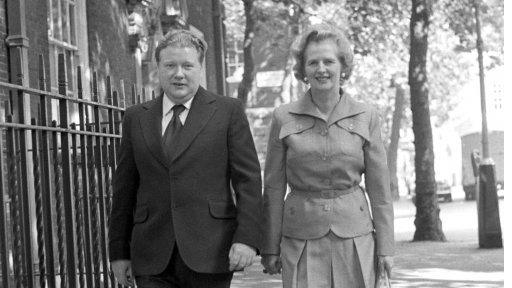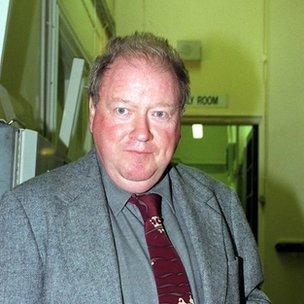Obituary: Lord McAlpine 1942-2014
- Published

As a member of a famous construction dynasty, Alistair McAlpine had a household name from birth.
His grandfather Sir Robert, known as "Concrete Bob", founded the firm, which remains one of the biggest builders in the UK, responsible for the London 2012 Olympic stadium among many other projects.
But Lord McAlpine, who has died aged 71, blazed a long and impressive trail of his own in public life - as an art collector, property developer, author, fund raiser and loyal political servant to Margaret Thatcher.
He hit the headlines again in 2012, when he was wrongly implicated in the sexual abuse of boys in the 1970s and 1980s.
Known as a jovial, cultured character, with a love of modern art, he was at one time one of the most powerful figures in the Conservative Party.
He was made a director of the family firm at 21, five years after dropping out of public school Stowe with three O-levels.
He went on to make a fortune of his own as a property developer in Australia. He was particularly identified with the town of Broome in Western Australia, where he won praise for developing tourism and the local pearl industry and restoring historic buildings, though he had to sell his interests in the town in the 1990s.
He was awarded the Freedom of Broome on his last visit there in 2012.
It was at a dinner party in 1975 that Lord McAlpine discovered his political vocation.
'Moral duty'
That was when he first met Margaret Thatcher, recently elected leader of the Conservative Party.
He became one of her closest and most devoted advisers and Conservative Party treasurer throughout her period in office, from 1979 to 1990.
She made him a life peer, Baron McAlpine of West Green in Hampshire, in 1984.
He is remembered as perhaps the most effective political fund raiser of his generation, helping to bankroll three successful general election campaigns.
But he also faced controversy after accepting donations from disgraced tycoon Asil Nadir's Polly Peck firm.
He later told the Daily Mail the Conservative Party should return the money.
"It is tainted money and it shames the Conservatives if they hang on to it. They have a moral duty to give it back," said the peer.
In parallel with his political career, Lord McAlpine became a leading art collector and gallery owner, with an interest in artists such as Mark Rothko, Morris Louis and Jackson Pollock.
Slow down
The peer took Lady Thatcher's rejection by her MPs in 1990 hard, remaining loyal to her in the difficult years that followed her departure from Downing Street and funding her private office.
The dedication of his book The Servant - an update of Machiavelli's The Prince - says: "To the most magnificent, Baroness Thatcher of Kesteven, Prime Minister of Great Britain 1979- 1990, from one of her many Servants, who believes she could have been better served."

Lord McAlpine - pictured here in 1998 - was a skilled political fund raiser
He turned his back on the Conservative Party at the 1997 general election, campaigning for Sir James Goldsmith's eurosceptic Referendum Party, although he returned to the fold some years later.
He was forced to slow down, and stop smoking, in 1987, after a seven hour heart bypass operation, complications from which led to him having a tracheotomy and difficulty speaking.
In recent years, he had largely disappeared from public life, opening a bed-and-breakfast in an old monastery in Puglia, Southern Italy with his third wife.
He had not sat in the House of Lords since 2010, following a change in law which meant that peers and MPs had to be tax resident and domiciled in the UK in order to remain in Parliament.
However, in 2012 he was again in the news when he was wrongly implicated by the BBC's Newsnight programme in allegations that politicians sexually abused boys in the care of the Bryn Estyn children's home in Wales in the 1970s and 1980s.
The report did not name Lord McAlpine but he was then wrongly identified on the internet.
The BBC apologised unreservedly and settled his defamation claim for £185,000.
The peer then pursued some of those who had named him on Twitter, including the wife of the Speaker of the Commons, Sally Bercow.
The High Court ruled her tweet was libellous, and she agreed to pay Lord McAlpine £15,000 in damages.
Other people who had tweeted his name avoided legal action by making donations to charity.
Lord McAlpine has three children, two from his first wife.
In a statement, they said: "It is with great sadness that the family of Lord McAlpine announce his peaceful death last night at his home in Italy."
The Prime Minister, David Cameron, said his thoughts were with the family and he praised Lord McAlpine's dedication to Margaret Thatcher and the Conservative party.
- Published18 January 2014